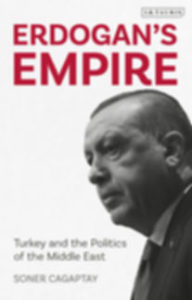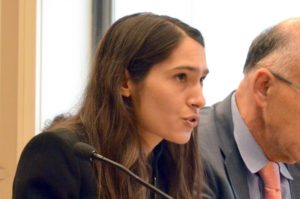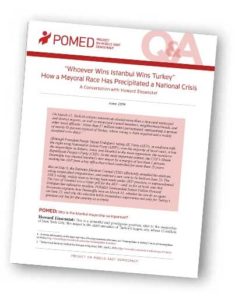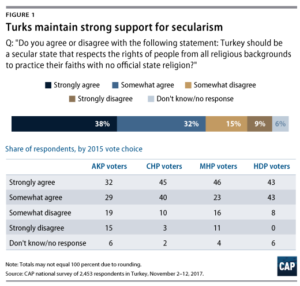 Istanbul’s new mayor says his election victory against Turkey‘s President Recep Tayyip Erdogan’s party carries an important lesson for the world’s populist leaders: Act against the will of the people you claim to represent, and you’ll lose it all. Ekrem Imamoglu is adamant that’s what happened when the ruling party’s candidate lost the race for city hall this year, Bloomberg reports.
Istanbul’s new mayor says his election victory against Turkey‘s President Recep Tayyip Erdogan’s party carries an important lesson for the world’s populist leaders: Act against the will of the people you claim to represent, and you’ll lose it all. Ekrem Imamoglu is adamant that’s what happened when the ruling party’s candidate lost the race for city hall this year, Bloomberg reports.
“The democratic stance put forth by Turkey this year proved the following: if you’re not acting in line with people’s interests, demands, freedom and rights, you get sent out,” Imamoglu told Bloomberg TV. “It’s a very valuable stance at a world where populism has made its peak.”
How did Recep Tayyip Erdoğan manage to transform Turkey from a liberal, secular democracy into a more religious, conservative state? The Washington Institute’s Soner Cagaptay, the author of “Erdogan’s Empire: Turkey and the Politics of the Middle East,” spoke to The World’s host Marco Werman about how Erdoğan got his start.
Ahead of Erdogan’s meeting at the White House this week, a bipartisan group of 17 members of Congress sent a letter which cites the “systematic rollback of democratic institutions in Turkey” as primary reasons why the United States should not host him, notes the Project on Middle East Democracy, a partner of the National Endowment for Democracy.

Credit: POMED
Erdoğan’s consolidation of power has caused a precipitous decline in the rule of law, POMED’s Turkey Program Coordinator Merve Tahiroğlu (right) testified to a U.S. Helsinki Commission hearing titled “At What Cost? The Human Toll of Turkey’s Policy at Home and Abroad.” As part of this power grab, he has co-opted the media, overseen mass purges of judges and prosecutors, and rammed through changes to the constitution granting unprecedented power to the presidency, she said In her testimony.
Once viewed as a responsible Islamic model, the Turkish republic is turning into a soft dictatorship, analyst writes for the National Interest.
 Although NATO is purportedly an alliance of democracies, Turkey is trending toward authoritarian one-man rule, according to Eric Edelman, a former U.S. Ambassador to Turkey and a senior advisor to the Foundation for Defense of Democracies’ Turkey project, and David J. Kramer, senior fellow in Florida International University’s Václav Havel Center for Human Rights and Diplomacy.
Although NATO is purportedly an alliance of democracies, Turkey is trending toward authoritarian one-man rule, according to Eric Edelman, a former U.S. Ambassador to Turkey and a senior advisor to the Foundation for Defense of Democracies’ Turkey project, and David J. Kramer, senior fellow in Florida International University’s Václav Havel Center for Human Rights and Diplomacy.
So what should be done? they ask in the American Interest:
- First, Congress, as a co-equal branch of government in the conduct of foreign policy, should continue to demand an immediate end to violence and attacks against the Kurds by Turkey’s proxies as well as Turkish forces in northeastern Syria.
- Second, the Administration should impose carefully targeted sanctions, as mandated by law, for Erdoğan’s acquisition of Russian military capabilities, which are incompatible with NATO. ….
- Third, the United States should coordinate with NATO allies to make clear that, while it values Turkey’s contributions to the Alliance, Turkey does not have a free pass to engage in reckless behavior.
- Finally, while Washington and European capitals should express appreciation for (and provide additional resources to cope with) the burden Turkey has borne for taking in several million refugees from Syria, it should make clear that threatening a mass release of refugees into Europe or forcible resettlement of refugees in the so-called Syrian “safe-zone” will trigger further sanctions. RTWT
 Turkey’s president is an enemy of the West, says human rights activist Kamal Sido of the Society for Threatened Peoples. At times, he writes for the Jerusalem Post, pro-Turkey lobbyists even admit that Erdogan:
Turkey’s president is an enemy of the West, says human rights activist Kamal Sido of the Society for Threatened Peoples. At times, he writes for the Jerusalem Post, pro-Turkey lobbyists even admit that Erdogan:
- is a member of the Muslim Brotherhood, who tries to implement its intolerant interpretation of Islam throughout the society;
- secretly supports the Islamic State (ISIS), which allowed ISIS to infiltrate its new recruits through Turkey;
- is an authoritarian demagogue who undermines democracy and pushes forward the rule of the radical mob;
- is an enemy to the Kurds, Christians, and Yazidis, and is carrying out ethnic cleansing in Northern Syria;
- is antisemitic, trying to weaken the influence of Israel and destroying the country;
- and finally, that his recent courting of Russia’s favor can be seen as evidence for him using Turkey as the Trojan Horse for Moscow in NATO.
The European Union no longer has as much influence over Turkey’s democratic trajectory as it once had at the height of the customs union and accession processes. With what leverage remains, the European Union should require recipients of funds from the European Union Regional Trust Fund in Response to the Syrian Crisis and the Facility for Refugees to adopt conflict-sensitive approaches in their programming, analyst Christina Bache writes for War on the Rocks (HT:FDD).







